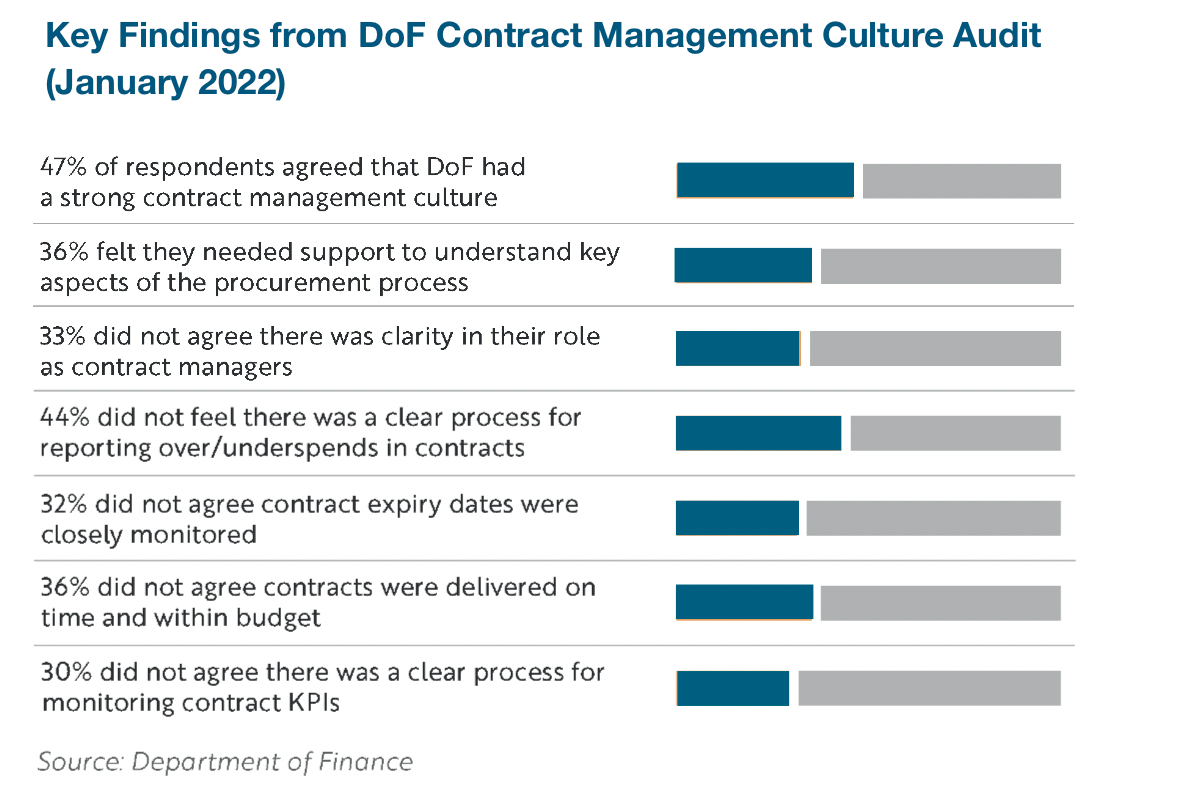Fundamental review of procurement processes needed

A persistent culture of undue risk aversion and concerns about the overall level of commercial capacity and capability are long-standing concerns in the system responsible for spending around one-quarter of Northern Ireland’s budget.
In a detailed report on public procurement in Northern Ireland, Comptroller and Auditor General, Dorinnia Carville, said that the structures and arrangements to provide leadership, governance, and accountability in public sector procurement “are not working effectively”.
In a highly critical report, the Northern Ireland Audit Office (NIAO) identifies several key structural weaknesses in current procurement arrangements, summarising that the Procurement Board has not sufficiently met its responsibilities during the last two decades.
Amongst its key recommendations, the NIAO has called for the Department of Finance to commission a fundamental review of procurement processes.
Public bodies depend upon procurement to purchase goods, services, and construction works, enabling them to deliver the services they are responsible for. The Department of Finance estimates that around 25 per cent of the total resources available to the Northern Ireland Executive are used for procurement.
The Procurement Board is responsible for ensuring that procurement activity is carried out effectively and delivers value for money, but the Comptroller and Auditor General assesses that there “is little evidence that the board has been effective in providing the strategic direction to ensure that procurement has operated effectively in Northern Ireland”.
Outlining the context for public procurement in Northern Ireland, the NIAO highlights that the quality of public procurement “has been subject to repeated criticism”.
“There has been a heavy emphasis placed upon the apparent inability of public bodies to deliver large-scale construction and IT projects on time and within budget, with weaknesses in procurement arrangements often highlighted as key reasons for failure.
“Key structural and cultural issues – particularly a culture of undue risk aversion and inadequate commercial capacity and capability across the wider public sector workforce – are said to underpin the examples of poor performance.”
The NIAO report does acknowledge some improvements in procurement processes in recent years. The 2020 New Decade, New Approach agreement made public procurement transformation a priority, and a number of initiatives, including the reconstitution of the Procurement Board, a social value policy, and a supply chain security policy, have been deemed successful.

However, the NIAO assesses that these improvements “have not fully addressed the strategic weaknesses in procurement arrangements”.
“While a new Procurement Board has recently delivered some improvements to processes, it does not provide the strategic direction necessary to a function that spends around a quarter of the Northern Ireland block grant,” it states.
“Without effective performance monitoring and in the absence of appropriate data, the Board is incapable of demonstrating that the Northern Ireland procurement function represents value for money.”
Amongst the key concerns raised by the NIAO are:
- the absence of a specific strategy for what procurement arrangements in Northern Ireland should look like;
- a pervasive risk to procurement practice across the public sector due to capacity and capability issues;
- a lack of governance and accountability at a strategic level to assess functionality; and
- a lack of centrally held, meaningful data about even the most basic aspects of procurement activity.
In recommendations to tackle these issues, the NIAO says that alongside the commissioning of a fundamental review, the Department of Finance should develop a new, time-bound strategy to underpin how procurement functions in Northern Ireland. Additionally, the report suggests the development of the strategic oversight of capacity and capability, including baseline standards for Centres of Procurement Expertise and contracting authorities, against which performance can be measured. Finally, the report suggests arrangements that will enable all bodies to provide complete, accurate, and timely procurement data, to enable effective oversight.
The Comptroller and Auditor General, Dorinnia Carville, has set out a belief that “without fundamental changes to culture and structures, as well as to processes, this is likely to continue”.
The Procurement Board, which was restructured in December 2020, cannot meet in the absence of a Minister of Finance, who chairs the board. The next Finance Minister will decide on the composition and role of any future Procurement Board.
Asked how the Department of Finance intended to take forward the Audit Office’s recommendations in the absence of a sitting board, a spokesperson for the Department said: “The Department welcomes the NI Audit Office’s report and its recognition of the progress made in delivering and implementing significant new policies relating to social value and supply chain security alongside improvements to the way in which policy and guidance is disseminated to and used by public bodies. Public procurement is a key enabler to deliver economic, environmental, and social considerations through public spending.
“At a time of financial constraints, having the right strategy, leadership, governance, and accountability for our procurement functions is of critical importance. Establishing the right structures and governance will require accurate and timely data, which the report has highlighted as an issue.
“The Department will work with NICS departments to review the recommendations and how these can be taken forward.”





